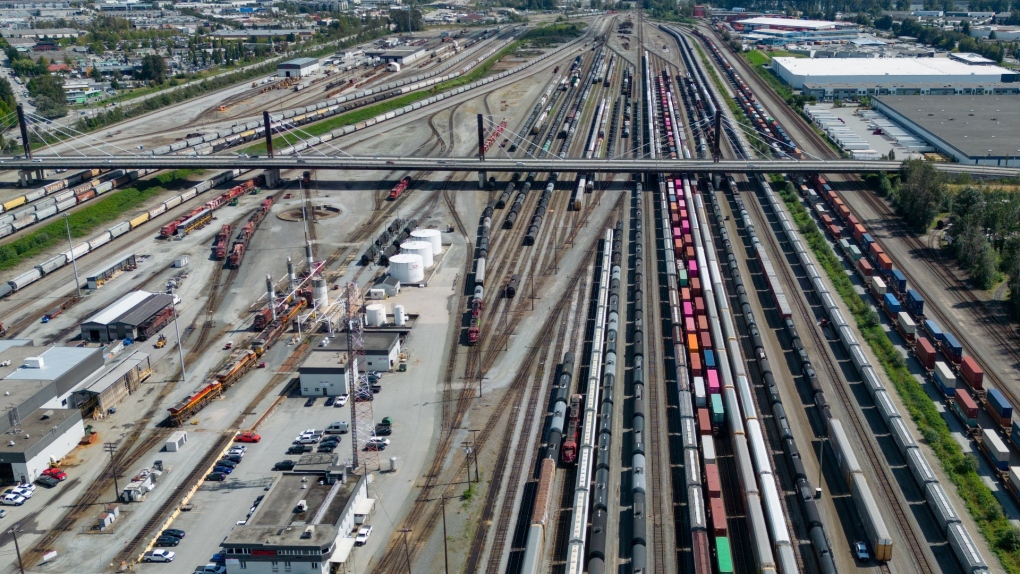Latest News
- Four years after Indigenous woman dies in Niagara Hospital, family still waiting for coroner's investigation
- Lawyer: British Columbia RCMP officer should be fired or resign immediately
- B.C. government looks to offer loan guarantees to property owners in Cowichan Aboriginal title area
- Uber driver's account in Toronto suddenly deactivated; only source of income cut off after 'duplicate account' claim
- TDSB education chief fired by provincial supervisor; sweeping changes at Canada's largest education board
Latest Ads
-
Jasmine Jewel
Call
-
Omidan group
Call
-
Amir Madanpour
Call
-
Dimo studio
Call
-
Yorkacademy
Call
-
Maryambagheri
Call
-
Shishlix Restaurant
Call

From meat to car and gas shortages, here's how rail work stoppages may impact Canadians
Canadians are awaiting the possible consequences of a work stoppage on the country's two largest railways, which could lead to everything from higher prices to shortages of meat, cars and gasoline.
Canadian Pacific Railway, Kansas City (CPKC) and Canadian National (CN) could face an unprecedented work stoppage starting Thursday if they fail to reach an agreement with workers represented by the Canadian Railway Teamsters conference. With more than half of the country's exports transported by rail and moving more than $1 billion in goods daily, a potential disruption to work at both companies could be problematic for Canadians.
The two major railway companies have already stopped transporting goods that require cold temperatures, such as meat. According to Chris White, CEO of the Canadian Meat Council, the ongoing service outages are causing "unprecedented damage" to Canada's meat industry, with some processing plants expecting to lose up to $3 million a week.
"For Canadians, such disruptions in the meat industry can be reflected on grocery store shelves," said Daniel Tsai, a lawyer and business professor at the Metropolitan University of Toronto and editor of ConsumerRights. "You might not see it in your wallet right away, but over time, you'll start seeing shortages and possibly price increases," he says.
A possible work stoppage could also affect the auto industry, Tsai added, as both companies distribute automotive rail and auto parts to major population centers across Canada and the U.S. Midwest. This can mean longer wait times for vehicles to be delivered, especially if there is a back-up in the supply chain.
Tsai says if a consumer has concerns about delays, whether for a car or another product, he suggests asking and being aware of shipping times. "If some things can only be shipped by rail, try to get an accurate estimate and see if there's a less expensive alternative way to ship it," he says. The sooner you do it, the better, he adds. "Then you can decide if it's worth the extra cost."
Tsai expects the possible work stoppage to hurt people's wallets. He warns that because the railways also carry large quantities of Canadian oil, there is also the possibility of gasoline shortages.
"The consequences of a possible work stoppage would be very painful for many small businesses that rely on rail to ship or receive their products," Jasmine Gaunt, vice president of national affairs for the Canadian Federation of Independent Businesses, told CTV.
"There is no substitute for problems," he says. "It's not like they can suddenly call a shipping company and ask them to pick up their goods." So we are really sorry to see this situation today."
So far, talks between the two railroads and the union have been inconclusive, with each side accusing the other of bad faith. Wages and scheduling are the main obstacles.
Labor Secretary Steven McKinnon, who took office about four weeks ago, insists the parties must do the "hard work necessary" to reach an agreement without relying on federal intervention. He is scheduled to meet with CN and union representatives in Montreal on Tuesday and with CPKC and the Teamsters in Calgary on Wednesday.
If no deal is reached, more than 9,000 workers will be locked out.
news source
Suggested Content
Latest Blog
Login first to rate.
Express your opinion
Login first to submit a comment.
No comments yet.


































